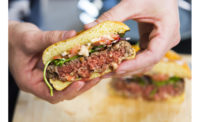With the public consuming more single-portion snacks than ever, food start-ups with the “next great” sauce, spread, condiment, dip, dessert or culinary delight must figure out how to navigate the delicate balance between conserving precious capital and providing professional-grade packaged products.
For portion cup packaging, that means selecting equipment that can provide the tamper-evident seals that retailers are increasingly demanding at a rate of speed that meets production requirements through the initial stages of growth and expansion.
Unfortunately, high-speed portion packaging equipment is all but unobtainable for small operations with price tags in the six figures, according to Steve Sallenback, co-owner ofLegacy Foods Manufacturing, an Elk Grove Village, Ill.-based co-packer.
This has created a market demand for low-cost, manual foil sealing machines—small enough to fit on a table-top or kitchen counter —that allow food start-ups to provide professional, tamper-evident packaging from day one. And, with several tiers of increasingly automated and faster models, food start-ups can scale up as demand and revenue allow.
Breaking into retail
“What is the cost of not having tamper-evident packaging? Probably never breaking into retail or taking your food start-up to the next level,” says Sallenback.
Beyond taste and value, even today’s small food operations must prove the product is safe for consumers, says Sallenback. Not only have consumers come to expect it, but also retailers, as an increasing demand for such packaging has become part of their food safety programs.
“Snap-on lids alone are not tamper-proof and do not provide evidence of tampering, since they can be removed and replaced without any noticeable change,” says Sallenback.
Besides tamper-evident packaging for safety, a sealed cup prolongs product quality and shelf life.
“A foil seal barrier can preserve product shelf life and freshness about four times longer than a typical, non-air tight snap-on lid,” says Kevin O'Rourke, food scientist and COO at PurFoods, an Ankeny, Iowa-based provider of fresh-made meals, home delivered nationwide.
If the foil seal barrier is sealed while the food is hot, then allowed to cool to create partial vacuum inside the cup, it can further prolong product life and quality, according to O'Rourke. The partial vacuum achieved with a foil seal is not usually achievable with most extruded or laminated plastics, he says.
When PurFoods was a small start-up food manufacturer, it began testing with table-top foil sealing machines from Wilpack Packaging, a Rockford, Ill.-based manufacturer of manual, semi-automatic and fully automated filling and sealing equipment. Wilpack Packaging’s products range from manually actuated units that can seal 8-12 containers of various sizes per minute to automated filler/sealers that can handle 80 containers a minute.
“At first, we wanted to see if we could compete with existing food products, and we were looking for new avenues of growth,” says O'Rourke. “After starting out with foil sealing on a smaller scale, we grew to need more and now use two automatic rotary fill and seal machines.”
Wilpack Packaging also acts as a consultant to food processors as they move from small operations to automated high-volume production.
“They worked with us from the beginning,” adds O'Rourke. “They helped us optimize our process and create samples of everything from puddings and Jello to tapiocas and fruit cups. They walk you from your start-up stage to fully automated lines, so you can start small from your kitchen and scale up as your business grows.”
Salmon Express Seafood, a Tacoma, Wash.-based wholesale salmon processor, recognized an opportunity when customers began asking for retail-sized, portion packaging of its salmon roe.
To add a retail side to his business, Alex Tulchinsky, founder and co-owner, turned to a table-top foil sealing machine from Wilpack Packaging. With the Wilpack Packaging’s cooperation, he optimized a new product category for his business—a half-pound retail plastic jar of salmon roe.
“The foil seal assures customers that our product is safe, and is branded with our name and logo to build brand loyalty,” says Tulchinsky, who also covers the product with a lid and sells it frozen for longer product life.
“To meet the public’s need for healthy, snack-sized food, we’re considering expanding into salmon jerky, smoked salmon and salmon sausages,” says Tulchinsky. “I believe if we make it convenient, it could become as popular as beef jerky with health-minded consumers.”
To meet the needs of other start-ups like Salmon Express Seafood, Wilpack Packaging introduced an even more economical table-top, manual, foil sealing machine called the Model-15 that provides professional-grade foil sealing at 8-12 cups per minute.
“For food entrepreneurs trying to get their product into a retail setting, Wilpack’s manual sealer is the lowest cost foil sealing machine I’ve seen that provides for portion control cups,” says Sallenback. “It’s a stepping stone to help small specialty food start-ups get onto retail shelves and start building volume with minimal capital risk.”
Branding opportunities without the spills and leaks
Additionally, sealedportion control cups minimize the potential leaks or spills from non-airtight covers such as snap-on lids, says Sallenback.
“Since a foil seal is more spill proof than a simple snap-on lid, it protects against unwanted leaks or spills in the grocery bag,” says Sallenback.
Sallenback adds that pre-printed foil seals on portion-control cups with the start-up’s name, logo or ingredients can also provide branding.
“Portion-control cups with a name or logo, for instance, are one of the most important ways for start-ups to promote their brand to retailers and the public,” says Sallenback.
In the portion-control industry, both retailers and the public view foil-sealed, portion-control cups as higher value items than squeeze packets or snap-on lids, since they are safer, easier to use and less liable to make a mess, according to Sallenback.
“Cups are the preferred way of portion control whether single use or deli style,” concludes Sallenback. “Today’s low-cost foil sealing machines, along with companies that collaborate with start-ups to help them grow, provide new opportunities for food entrepreneurs, retailers and the public.”




